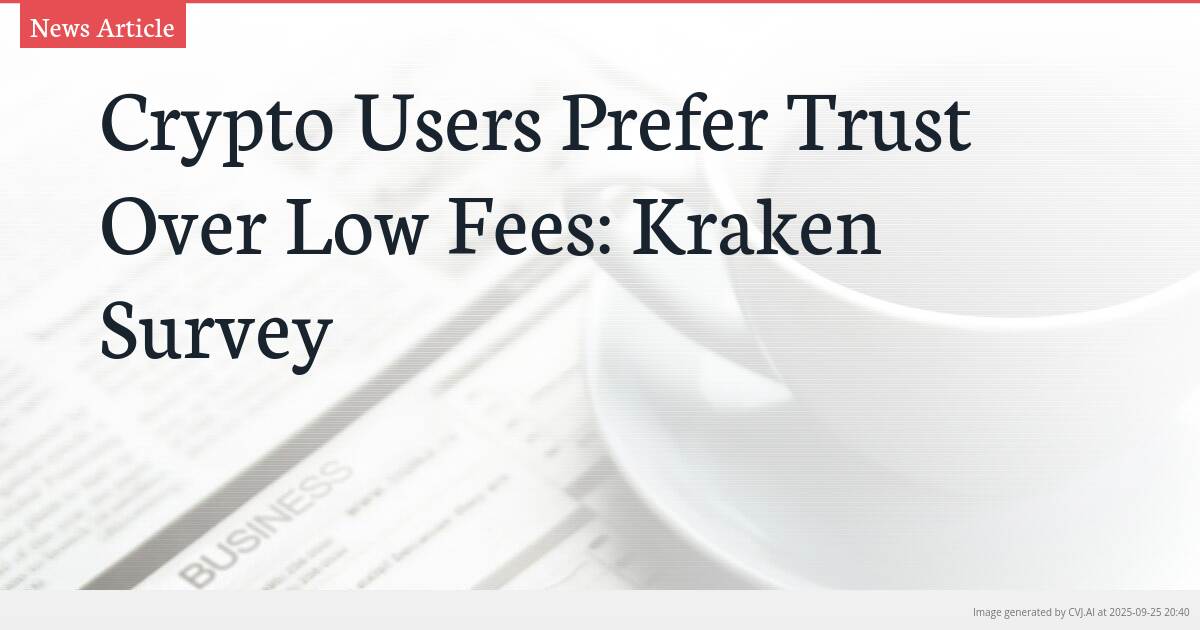This summary text is fully AI-generated and may therefore contain errors or be incomplete.
Introduction
A new survey from cryptocurrency exchange Kraken reveals a significant shift in American investor priorities: trust now outweighs cost concerns. The study of 1,000 U.S. crypto users found that 79% would pay higher fees on exchanges they trust, signaling maturation in a market once dominated by fee-sensitive traders. This preference for reliability over bargain hunting reflects evolving consumer behavior following high-profile industry collapses and increasing platform sophistication.
Key Points
- 79% of U.S. crypto users would pay higher fees for trusted exchanges, with only 16% citing fees as their top priority
- 44% of respondents use two exchanges, while 26% use more than two, primarily to diversify risk and access different digital assets
- Decentralized exchanges saw trading volume surge to $478 million last month, a 259% increase compared to the previous year
The Premium on Trustworthiness
The Kraken survey demonstrates that American crypto users are fundamentally reevaluating what matters most when selecting trading platforms. While only 16% of respondents identified fees as their primary consideration, a substantial 26% cited trustworthiness as their top factor—making it the most important attribute for exchange selection. Security features followed closely at 14%, indicating that users are prioritizing asset protection above all else. This represents a notable departure from the early days of cryptocurrency trading, when minimal fees often drove platform selection.
Mark Greenberg, global head of consumer at Kraken, interprets these findings as evidence of market maturation. “As the market matures, investors are showing they value long-term confidence over short-term savings,” Greenberg told Decrypt. “People want to know their assets are safe, that the platform is reliable, and that they can access the tools they need without unnecessary complexity.” This sentiment appears to reflect lingering concerns from the 2022 collapse of FTX, whose former CEO was found to have misappropriated $8 billion in customer funds, creating lasting skepticism toward exchange operations.
The Multi-Exchange Strategy
Despite their strong preference for trusted platforms, most American crypto users aren’t putting all their digital assets in one basket. The survey found that 44% of respondents maintain accounts on two exchanges, while another 26% use more than two platforms simultaneously. This multi-exchange approach serves several strategic purposes: diversifying platform risk, gaining access to different digital asset listings, and separating trading activity from long-term investment holdings.
This behavior reflects a sophisticated understanding of risk management among crypto users, who appear to be hedging against potential platform failures or service disruptions. The strategy also allows investors to capitalize on different exchanges’ strengths—using one platform for its user interface and another for its asset selection. Notably, this multi-platform approach exists alongside the willingness to pay premium fees for trusted services, suggesting users are making calculated trade-offs between security, convenience, and cost.
Decentralized Exchanges Gain Traction
While centralized exchanges like Kraken and Coinbase dominate the landscape, decentralized platforms are experiencing remarkable growth. According to a Dune dashboard, decentralized exchanges generated $478 million in trading volume last month—a 259% increase compared to $133 million a year ago. Platforms like Uniswap, which use smart contracts to enable peer-to-peer trading without intermediaries, are capturing significant market share as users seek alternatives to traditional exchange models.
This growth coincides with heightened competition among decentralized platforms. The rivalry between Hyperliquid and Astar has drawn considerable attention, with Binance co-founder Changpeng Zhao publicly endorsing the latter project built on BNB Network. This endorsement from a major industry figure highlights the increasing legitimacy and competitive pressure within the decentralized exchange space, which offers users different trade-offs in terms of control, security, and convenience compared to their centralized counterparts.
Regulatory Compliance Takes Back Seat
Perhaps surprisingly, regulatory compliance ranked as the least important factor for American crypto users when selecting exchanges, with only 6% identifying it as their top priority. This indifference persists despite increased regulatory scrutiny following the FTX collapse that extended into the final days of the Biden administration. Customer support was only slightly more important at 7%, suggesting that users are primarily concerned with fundamental platform reliability rather than ancillary services.
The survey results arrive as Kraken reportedly prepares to go public, though it remains unclear how dependent the exchange is on fee revenue. For context, Coinbase disclosed that transaction revenue accounted for 53% of its total revenue—$764 million—in the second quarter of this year. Both platforms have faced operational challenges: Kraken has dealt with critical bugs, while Coinbase suffered a massive data breach earlier this year that the company initially estimated could cost up to $400 million. These incidents underscore the ongoing security challenges that may be driving users’ emphasis on trustworthiness.
📎 Read the original article on decrypt.co

